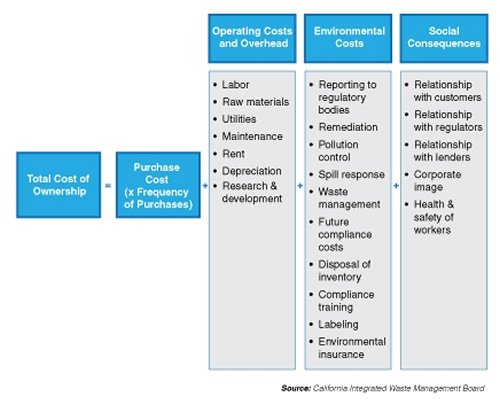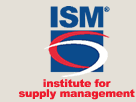Home > Publications > eSide Supply Management

Sustainability & Social Responsibility
Green Purchasing
Author(s):
Kady Srinivasan
May/June 2009, eSide Supply Management Vol. 2, No. 3
Building an Actionable Framework
If you were a purchaser of horses in 1900, you would have been given a rejection list: big, coarse heads; sunken eyes; light color; bad girth; flat sides; thick or short necks — the list goes on. Naturally, a "good eye" for horses — intuition — was the primary job description. At that time, horse selection was more art than science.
When confronted with sustainability decisions, as supply management professionals, you might feel like you have been transported back to 1900. Few robust metrics, quantitative factors or practices exist in the area of sustainability purchasing. Moreover, most of green purchasing is still based on inexact science and half-complete measurements.
These days, you are on the front lines of sustainability purchasing. You possess decision-making capabilities that have impact beyond your organizations.
Even so, green purchasing is still in its nascent stages. A significant need exists for standardized, solid practices, metrics and frameworks to help you establish a business case for green products and methods to cost-efficiently implement those practices.
The New Bottom Line
Supply management professionals must balance multiple demands from multiple internal and external groups. You manage a host of tradeoffs — cost, quality and schedules — with eco-efficiency, among other factors.

When considering what or from whom to buy, you must ask yourselves certain questions. A few examples:
- Should you purchase organic coffee for your chain of restaurants, even though customers might not pay for it?
- Should you buy hybrid trucks for your fleet, even though oil prices are currently low?
- Should you choose canned goods that use less tin and aluminum, but run more risk of product damage at the retail level?
Without a clear direction and strategy, it is easy to make bad decisions that dramatically increase spending but reduce quality.
4 Main Drivers
The place to start is by recognizing the different drivers that influence sustainability purchasing within your organization. Knowing what is important to the senior leadership’s business strategy goes a long way in helping to identify necessary tradeoffs.
For the most part, sustainability purchasing drivers fall into four main categories: risk reduction, cost efficiency, performance improvement and innovation/new product development (NPD). Each driver influences purchasing across products (or services) and processes.
Product purchases are all those purchases that go into cost of goods. Process purchases are all purchases that enable better operations within the organization. (At Starbucks, for instance, free-trade coffee is a product purchase. Energy-efficient espresso machines, on the other hand, are process purchases.)
Combined, these four drivers and types of purchasing (product-versus-process) engender multiple kinds of purchasing needs. Here is an example:

Above, each gray cell represents a product purchase or process purchase driven by the four categories listed across the top. Mapping them in this way gives you a better idea of the demands you face from various groups.
The complexity of your own matrix will depend on the business, but one thing is for certain: As supply management professionals, you must be able to manage priorities and act on those purchasing decisions that provide long-term value to the organization.
The One-Number Purchase Price
Even when immediate purchasing needs are identified, the battle is only half won. With regard to measurement, big questions remain:
- What is the best system of measurement for products, particularly as they relate to environmental performance?
- How can similar products be compared on the dimensions of cost, quality, schedule and so on?
Today, most supply management professionals try to manage these individual tradeoffs depending on the kinds of products they want to purchase, those products’ environmental tradeoffs and which groups within the organization need those products.
With regard to true cost, tradeoff analyses can be misleading. A holistic computation methodology such as total cost of ownership (TCO) — which includes environmental consequences — is more applicable and provides better results than simple tradeoff analyses. To illustrate, TCO would be computed as follows:

In this example, operating costs are all costs associated with operating (maintenance, repair, depreciation and so on) over a multiyear period. Environmental costs are associated with the use of land, water, energy and other resources. Social consequences are all costs associated with health and safety of workers and the need for maintaining social programs associated with a particular product — fair-trade coffee, for example.
Viewed through this lens, products now have a one-number purchase price that lets you compare and contrast them with other products. The value of these one-number "sticker tags" cannot be overemphasized: Organizations that undergo this exercise stay ahead of the learning curve and have a better grasp of environmental costs and social consequences.
For Long-Term Purchasing Decisions, Use Supplier Assessments
Calculating and instituting TCO lets you evaluate products on a common-denominator basis. However, for long-term purchasing that adds value to the organization, a supplier assessment also should be conducted. As an example, products from the best organic supplier would not be very useful if the supplier found itself in financial difficulty or could not provide the volume your organization needs.
To this end, consider a long-term strategy of looking at a supplier’s "collaboration quotient" — its ability to collaborate and innovate, as well as its current product cost, expressed as TCO:

As shown above, suppliers that score high on collaboration quotient and low on TCO are the ideal partners.
Other Success Factors
Other factors dictate any such initiative’s effectiveness, as well. For instance, most purchasing departments are unsure of metrics and incentive structures for buyers, and many purchasing departments still struggle to find the right balance between centralized operations and localized purchasing practices. Overcoming suppliers’ lack of awareness is another issue. The list of operational elements that need to be aligned is a long one.
Sustainability Is Here to Stay
Even the most cynical critics realize the potential business impact of climate change and environmental regulations. As a concept, the financial and social benefits of sustainability are clear. As supply management professionals, you will increasingly be called on to act as gatekeepers and to help mobilize such practices.
Although green purchasing might seem to be a "big, hairy, audacious goal," small steps taken in its direction will produce tremendous impact for all stakeholders.
Kady Srinivasan is a manager with Raleigh, North Carolina-based Clarkston Consulting. Caitlin Cronin and Deniz Olcay contributed to this article. To contact the author, please send an e-mail to author@ism.ws.
For more articles and resources on green purchasing, visit the ISM articles database.
Take me to the eSide home page.
Related Resources:CPSM® Exam 1 Study Guide - A study tool for the CPSD ™ designation |
Content Recommendations:CPSM® Exam 1 Study Guide - A study tool for the CPSD ™ designation Strategic Procurement Interfaces |
-
About ISM
- Overview of ISM
- Media Room
- ISM Board of Directors
- ISM Officers Directory
- Affiliate Officers Directory
- ISM Affiliate Web Sites
- ISM Group and Forum Web Sites
- Frequently Asked Questions
- Chair's Corner
- ISM Annual Reports
- J. Shipman Gold Medal Award
- ISM Awards for Excellence
- Supply Management Month
- Association Governance
- ISM Ethical Principles and Standards
- Activity Calendar
- Principles of Social Responsibility
- ISM Position Statements
- Membership
-
Members Only
- InfoCenter
-
Member Information & Online Tools
- ISM Glossary of Key Supply Management Terms
- Access to CIPS Members Only Content
- Access to Supply Chain Council (SCC) Member Discounts and Resources
- ISM Tool Kit
- ISM Resource Guides
- ContractWare®Net and eTool Agreements
- Address Update Form
- Activity Calendar
- Affiliate Websites
- Group & Forum Websites
- ISM Principles and Standards of Ethical Supply Management Conduct
- ISM Group/Forum Enrollment Information
- Job Descriptions
- The Business Source
- Propurchaser.com
- eVendor Check
- Personal Professional Development Scorecard
- Affiliate Resources
- Career Center
-
Affiliate, Groups & Forums
- Affiliate, Group/Forum Award Information
- Group/Forum Enrollment Information
- Group/Forum Enrollment Form
- Groups & Forums Brochure and Flyer
- Group & Forum Case Studies
- Groups & Forums Promotion
- Spotlight on Groups and Forums
- Group and Forum Officers
- Affiliate Web Sites
- Group & Forum Web Sites
- Affiliate Officers
- ISM Officers
- Sign up for ISM's Groups and Forums Discussion List Servs
- Search for Speakers
- Discussion Forums
-
Additional Resources
- ISM Resource Guides
- Bid Specifications Database
- Purchasing/Supply Management Periodicals
- Other Web Resources
- Practix - A quarterly Best Practices publication
- ISM's Principles and Standards of Ethical Supply Management Conduct
- Associations/Organizations Useful to Purchasing/Supply Management Professionals
- CIPS Study
- Search Articles
- CIPS Members Only Content
-
Ethics and Social Responsibility
- ISM Ethical Principles and Standards
- Principles of Sustainability and Social Responsibility
- Business Case
- Supporting Organizations
- Fostering Sustainability and Social Responsibility Form
- Research
- Articles
- General Resources
- Training
- Assessments
- Metrics and Indices
- International
- ISM's Committee on Sustainability and Social Responsibility
- Job Descriptions
-
Education - Seminars, Conferences
- Conferences
- Seminars
- Knowledge Center — Online Courses
-
ISM-ADR School for Supply Management
- Customized and Standard Training and Development
- Professional Development Seminars (In-house, Instructor-Led)
- Knowledge Center Courses (Web-based, Online)
- DNA (Development Needs Analysis)
- ISM-ADR School for Supply Management Brochure
- Summary of all Program Formats
- Your Dedicated Program Managers
- Request for Professional Development Information
- Speaking Opportunities
- Speakers Directory
- Academic/Student Opportunities
- Glossary of Key Supply Mgmt Terms
- ISM Resource Guides
- ISM Tool Kit
- Exhibiting/Sponsorship Opportunities
- Products
- Publications
-
Professional Credentials
- Frequently Asked Questions
- Certified Professional in Supply Management®
- Certified Professional in Supplier Diversity
- Certified Purchasing Manager (C.P.M.)
- Accredited Purchasing Practitioner (A.P.P.)
- Certification Forms
- Work Experience Information
- Credentials Discussion Forum
- Credentials Verification
- Additional Program Information
- International Certification Contacts
- Supply Line 2055: Certification Update
-
ISM Report On Business®
- Latest Manufacturing ROB
- Latest Non-Manufacturing ROB
- Reports On Business® Overview
- Report On Business® Brochure
- Semiannual Reports
- Seasonal Adjustments
- Manufacturing Data
- Non-Manufacturing Data
- ROB Graphical Data
- Regional Business Survey Data
- How to Respond to ROB
- ROB Online Infokit
- JPMorgan Global PMI Reports
- Other Economic Information
- ROB Release Dates
- ROB Frequently Asked Questions
- ISM/Forrester Research Report
-
Career Center
- Your Profile
- Register for the Career Center
- Job Seekers
- Employers' Corner
-
More Career Resources
- Job Descriptions
- Job Hunting Sites on the Web
- Job Hunting Sites for Specific Regional Areas
- Job Hunting Sites with Tools Such as Resume Writing Advice
- Careers In Supply Management
- Resources on Relocating
- Salary/Career-Building Resources
- Schools Offering Purchasing/Supply Management Courses
- Scholastic Opportunities
- Frequently Asked Questions
- CAPS Research
-
Tools
- InfoCenter
- Research Tools
- Business Book List
- Discussion Forums
- Directories
- Affiliate Resources
- Group & Forum Information
- eTool Agreements
- ISM's Principles and Standards
- Supply Management Defined
- Other Association Links
- Other Related Information
- The Business Source
- Propurchaser.com
- eVendor Check
- Purchasing & Supply Sourcing Guide
- Access CIPS Members Only Content
- Access to Supply Chain Council (SCC) Member Discounts and Resources

In This Section: ![]()



